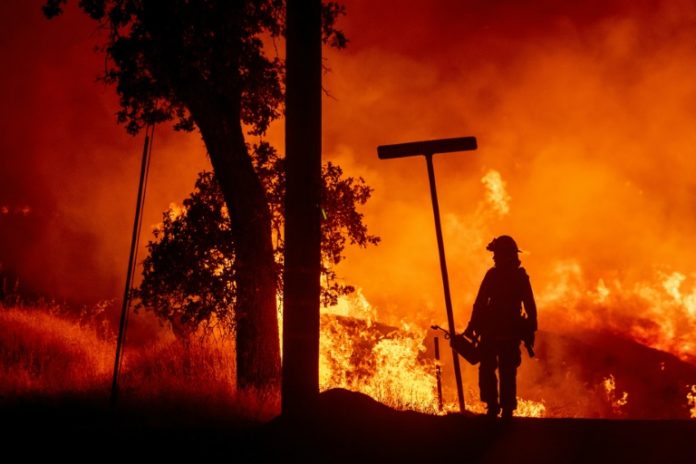YORBA LINDA, United States, Sept 3, 2018 (BSS/AFP) – Matt Shobert opens
his eyes and wishes he was dead, a recurrent thought that started four years
ago when the former firefighter first contemplated taking his own life.
He is not the only one: some of his comrades suffer in silence, and some
end up committing suicide.
Fighting forest fires such as those that have ravaged the western regions
of the United States this summer means days that are both exhausting and
interminable, while the death and destruction weigh heavily on the minds of
those tasked with stemming the flames.
“You’ve got firefighters working 12 to 36 hours straight on the fire line,
so they are physically exhausted, they are emotionally exhausted because
we’ve been killing firemen in these fires, firemen have been dying,” said
fire chief Tony Bommarito in Yorba Linda, 40 miles (65 kilometers) south of
Los Angeles.
California, one of the worst-hit states, has seen five firefighters die
battling the flames so far this year. Across the whole country, that number
rises to 64, according to official figures.
That figure does not include the 45 who killed themselves in 2018,
according to Jeff Dill, whose Firefighter Behavioral Health Alliance (FBHA)
group helps those battling depression or Post Traumatic Stress Disorder,
otherwise known as PTSD.
“We are not superheroes. Everybody has a limit,” said Bommarito, 48.
“We are expected to act brave, strong, courageous to help, don’t ask for
help,” said Dill, a retired firefighter whom Matt Shobert called when his
thoughts turned to leaping off a bridge in San Diego.
– Left with nothing –
Shobert, 56, was overseeing a clean-up in the middle of nowhere: the brush
was dry and combustible, perfect tinder for a forest fire.
In a freak accident, the blade of commercial-grade mower hit a rock and
fired it like a missile into his jaw: the operator of the machine was half a
football field away and failed to notice what had happened.
Shobert was knocked out cold, and was covered in blood when he woke up. He
was not sure how he was going to make it 500 yards to his pick-up truck to
call for help.
“I basically had this very traumatic injury and I had to save my own life,”
he said. “After spending about 30 years in the fire service, dealing with
death and destruction and carnage, and I think all those things came
together.”
It took him a long time to recover from his injury. When he returned to
work he was not the same man, oscillating between bursts of anger and
sadness.
“I realized at that point I had to retire from the fire service and that
was all I knew for the past 30 years because it was my life, it was my hobby,
it was everything I did. And in a split second it was taken away,” he said.
“I contemplated suicide. And for whatever reason I decided to just call a
friend of mine… rather than jump off the bridge in San Diego,” he said.
Shobert was diagnosed with PTSD and since then has undergone therapy and
taken medication, but the road is long and hard.
“I still wake up in the morning and sometimes wish I was dead,” he said.
“I’m still fairly miserable, but at least now I have a tool box.”
Dill became interested in the mental health issues that his “brothers and
sisters” were facing when a group from his fire station came back from
helping out in New Orleans in 2005, after the devastating Hurricane Katrina.
He felt the therapy they were offered was not enough, so he started
studying and began the transition from firefighter to counselor.
He has tallied 1,200 suicides over the past 20 years, including 93 in 2017.
But Dill thinks that only represents around 40 percent of the actual number
of suicides, because his research depends on families and friends coming
forward with the information for his list.
– ‘A dark place’ –
Experts say that the decision to commit suicide is often the result of an
accumulation of factors.
That is what happened with Mike Bilek. It was his past in the military,
then as a firefighter, all mixed in with unspecified personal issues, that
led him to think about killing himself.
“At one point, I was getting into such a dark place that I started having
those thoughts of suicide,” he said.
“I never got to the point where I was going to act out on it,” he said.
“But the fact that those thoughts were even creeping into my head really
scared the daylights out of me.”
Bilek sought help and now treats his condition with a combination of
therapy, medication and meditation, which he needed more than ever when a
back injury forced him to retire at 39 and start a new life.
There is more talk these days in fire stations about mental health issues,
with support groups, but there is still resistance.
Dill said he recently talked with seven firefighters diagnosed with PTSD
who were “fired from the job because they were told, ‘Well you can’t do the
job no more,'” he said.
In his mission to spread the word, Dill bought a caravan so he can travel
the country and talk to firefighters about their mental health.
And as he left the fire station in Yorba Linda, he received a text message
on his cell phone: another suicide.



